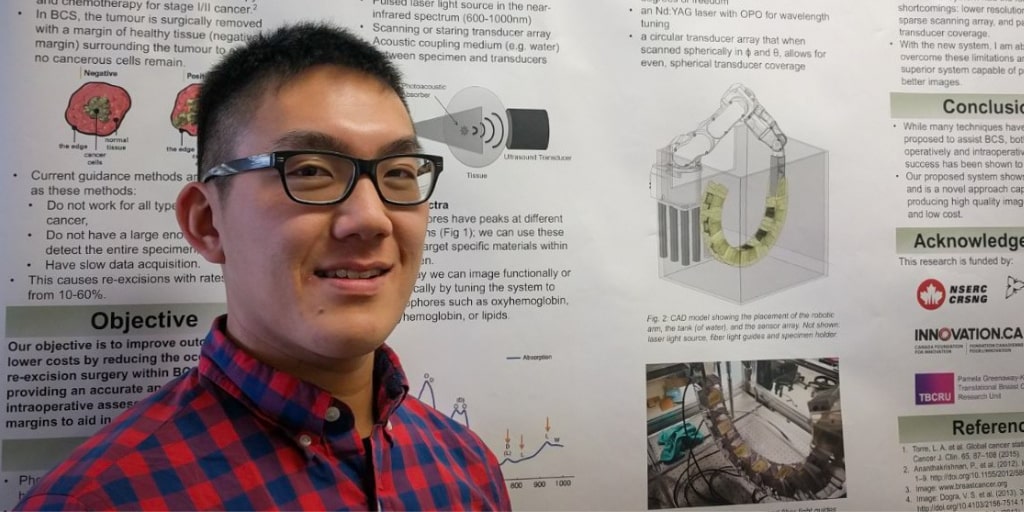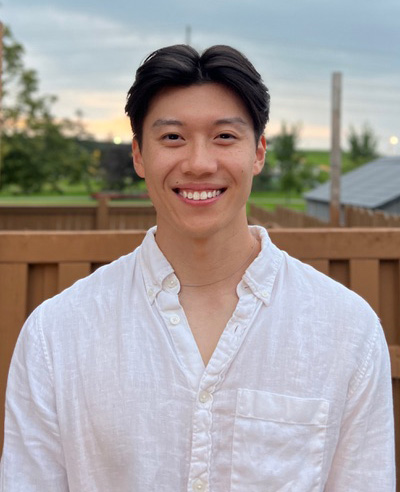1. Who are you? Tell us about yourself.
Currently, I am a PhD candidate at Western University, based out of St. Joseph’s Health Care under the supervision of Dr. Jeffrey Carson. We also work closely with surgical oncologist Dr. Muriel Brackstone. I am part of the Medical Biophysics graduate program at Western, where I focus on developing new imaging technology for clinical problems.
2. Why is the TBCRU Studentship Award important to you?
I have been a recipient of the TBCRU Studentship Award (supported by BCSC) since 2015. I’m honoured by their continued confidence in my research; the funds provided by this award allows me to focus on the critical research we are doing.
3. Tell us about your research. What are you doing and what problems do you hope to solve?
My work focuses on a specialized imaging technique called photoacoustic imaging and its use for breast-conserving surgery. On the technological side, I am working on overcoming limitations, so that the imaging will be more accurate. Secondly, I am applying this improved technology towards imaging breast tumours (after they have been removed) to ensure that the tumour was removed completely. Our goal is to eliminate the need for additional surgeries, which happen approximately 15% of the time when surgery is only partially successful. Currently, I am excited to be putting together my third (and hopefully final) imaging system incorporating everything I learned in the last few years. We hope to be testing this on clinical samples by Fall 2019.
4. Why is your research important? How can your research be applied in the real world?
My research not only advances our knowledge in the growing field of biomedical optics, but also has a direct impact on patient care. No one suffering from breast cancer should need to hear the disappointing news that they need an additional surgery because of remaining tumour tissue. The goal of our research is to render these extra surgeries unnecessary, sparing the patients an additional hardship and freeing up our healthcare system.
5. What inspired your research?
Our lab has been working on breast imaging for a number of years. Photoacoustic imaging is particularly useful for breasts because it can provide excellent soft tissue contrast. My project is a continuation of another student’s work, where he demonstrated that we can see great contrast between tumour and healthy breast tissue.
6. Why are you passionate about breast cancer research?
I have always been interested in health care, from both a clinical and research standpoint. When this project was proposed to me, I thought it was a great opportunity, and my interest in the topic has only grown from there.
7. Why do you think breast cancer research matters?
Breast cancer research matters because the people affected by breast cancer matter. Any goals or hopes that I have in my research really only matter because they are directly linked to improving patient care – to reducing the burden of this disease that affects friends, family, and coworkers.
8. What excites you about your work?
It excites me to be able to build devices from the ground-up, see them in action, and then watch as they directly improve someone’s care and comfort.
9. What do you see yourself doing in the future?
Once I complete my PhD, I hope to be working in Research & Development for a medical device/technology company.
10. What do you like to do when you aren’t working on research?
I have a number of hobbies! You can find me playing a number of sports like cycling, running, soccer and softball. I also enjoy tinkering with bicycles, running the audio and visuals at my church, and taking long backcountry hiking trips.
Support researchers like Lawrence Yip by considering a donation to the Breast Cancer Society of Canada. Find out how you can help fund life-saving research, visit bcsc.ca/donate today.




